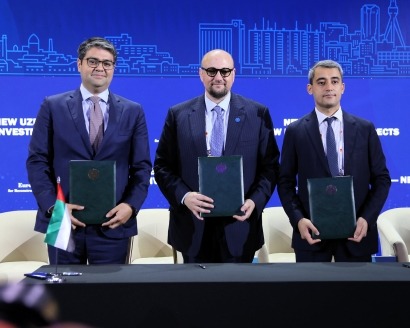
The development represents deepening relations between the UAE's clean energy powerhouse and Uzbekistan, which aims to achieve 25 percent of its energy mix from renewables by 2030. The Central Asian nation, abundant in wind and sunshine, is a key strategic destination for Masdar. Uzbekistan plans to achieve 7 GW of solar and 5 GW of wind capacity by the end of the decade.
Dr. Sultan Al Jaber, UAE Minister of Industry and Advanced Technology, Chairman of Masdar, and COP28 President-Designate said; “The UAE is fully committed to supporting countries to decarbonize. Uzbekistan is a key strategic partner, and we continue to work together to deliver renewable energy projects that power homes and businesses, while crucially cutting emissions.
"The world needs to triple global renewable energy capacity by 2030 to reach the goals set out in the Paris Agreement. As we prepare to host COP28 in the UAE, we believe ambitious partnerships with countries like Uzbekistan are vital in helping to meet this target.”
The JDA was jointly signed by Azim Akhmedkhadjaev, First Deputy Minister of Energy of the Republic of Uzbekistan, Sarvar Khamidov, Deputy Minister of Investment, Industry and Trade of the Republic of Uzbekistan, and Mohamed Jameel Al Ramahi, Chief Executive Officer of Masdar. The signing ceremony was held in Uzbekistan on May 17, 2023.
Mohamed Jameel Al Ramahi, CEO of Masdar, said, “We are making history together in Uzbekistan. “Our agreement to develop 2 GW of solar and expand into 500 MWh of battery storage, marks an exciting new chapter in Masdar and Uzbekistan’s shared journey. Uzbekistan is a key partner and Masdar is proud to support its ambitious renewable energy goals.”
Masdar has been active in Uzbekistan since 2019, with the 100 MW Nur Navoi Solar Project, which is the nation's first successfully financed independent power producer solar project. The plant has been operational since 2021.
Masdar's growing portfolio in Uzbekistan includes the largest wind farm in Central Asia, the 500 MW capacity Zarafshan plant. Last month, Masdar reached financial close on three solar projects in Jizzakh, Samarkand and Sherabad, which have a combined capacity of around 900 megawatts – making it the largest solar development program in Central Asia. Once fully operational, the projects will generate enough electricity to power over one million homes, while displacing around one million tons of carbon dioxide annually.

